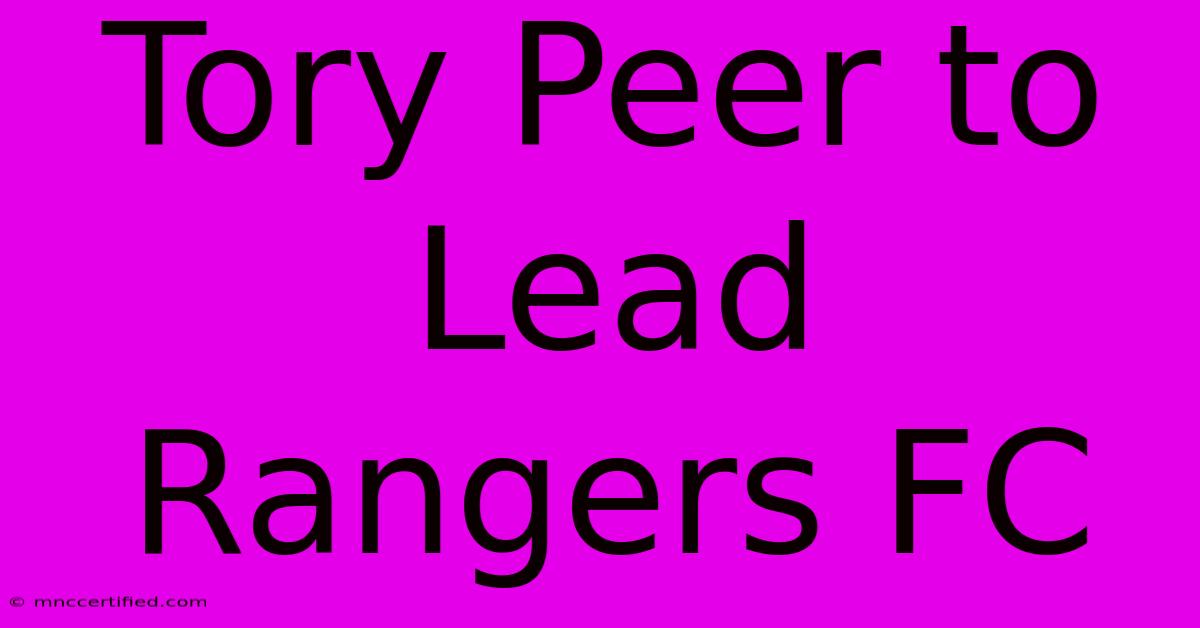Tory Peer To Lead Rangers FC

Table of Contents
Tory Peer to Lead Rangers FC: Douglas Ross Appointed Chairman – A Deep Dive
The appointment of Douglas Ross, a prominent Conservative Member of Parliament and Tory Peer, as Chairman of Rangers Football Club has sent shockwaves through the Scottish footballing landscape and beyond. This move raises significant questions about the intersection of politics, business, and sport, prompting considerable debate among fans, analysts, and the media. This article will delve into the implications of this appointment, examining the potential benefits and drawbacks, and exploring the wider context of the decision.
Understanding the Appointment: Douglas Ross's Background and Qualifications
Douglas Ross, a Member of the Scottish Parliament (MSP) and a Member of Parliament (MP) at Westminster, brings a unique background to the role. While lacking direct experience in football club management, his political career showcases strong leadership and negotiation skills, potentially valuable assets in navigating the complexities of running a high-profile football club like Rangers. His background in law also provides a solid foundation for understanding the legal and financial intricacies of the position. However, critics point to a lack of experience in football administration as a potential weakness. His appointment is undoubtedly a bold move by the Rangers board, signifying a shift in their approach to leadership.
Beyond Politics: Ross's Business Acumen
While his political career dominates public perception, it's crucial to consider Ross's business experience. While specifics may be limited in public domain, understanding his broader business acumen is vital to assess his suitability for the role. This involves investigating his past engagements, financial literacy, and overall strategic thinking capabilities as they relate to corporate governance and financial management within a football club environment. His ability to attract investment and manage budgets effectively will be key to his success as Chairman.
Analyzing the Potential Impacts: Benefits and Drawbacks
The appointment of a Tory Peer presents both potential advantages and disadvantages for Rangers FC.
Potential Benefits:
- Enhanced Political Connections: Ross's political network could prove beneficial in securing sponsorships, navigating regulatory hurdles, and influencing decisions within the Scottish footballing authorities.
- Strong Leadership and Negotiation Skills: His experience in political debate and negotiation could be invaluable in dealing with complex issues within the club and with external stakeholders.
- Improved Public Image (Potentially): Depending on public opinion, his appointment might enhance Rangers' image in certain circles, potentially attracting new fans and investors.
Potential Drawbacks:
- Conflict of Interest Concerns: His political role raises potential conflict of interest concerns that need careful management to avoid any perception of bias or favoritism.
- Lack of Football Expertise: His lack of direct experience in football club management could be a significant hindrance in making informed decisions regarding team strategy, player transfers, and operational management.
- Polarizing Figure: His political affiliation is inherently divisive, potentially alienating a segment of the Rangers fanbase and creating internal friction.
The Wider Context: Politics and Football
The appointment highlights the increasingly blurred lines between politics, business, and sport. Football clubs are major commercial enterprises, and political influence can significantly impact their operations and success. This appointment invites discussion about the appropriate level of political involvement in football governance and the potential impact on the integrity of the sport.
Conclusion: A High-Stakes Gamble
Douglas Ross's appointment as Chairman of Rangers FC is a high-stakes gamble. While his political experience and business acumen offer potential benefits, his lack of football expertise and the inherent divisiveness of his political affiliation present significant challenges. The success of this appointment will depend heavily on his ability to navigate these complexities, build consensus among stakeholders, and demonstrate effective leadership in the demanding world of professional football. Only time will tell if this bold move proves to be a masterstroke or a costly mistake. The next few months and years will be crucial in evaluating the long-term implications of this significant appointment.

Thank you for visiting our website wich cover about Tory Peer To Lead Rangers FC. We hope the information provided has been useful to you. Feel free to contact us if you have any questions or need further assistance. See you next time and dont miss to bookmark.
Featured Posts
-
Arsenal Victory Nwaneri Scores
Nov 24, 2024
-
South Shields Rout Farsley Celtic 5 1
Nov 24, 2024
-
Brighton 2 1 Bournemouth 2024 Game Analysis
Nov 24, 2024
-
Arsenal Defeat Nottingham Forest 3 0
Nov 24, 2024
-
Leicester Player Ratings Chelsea Game
Nov 24, 2024